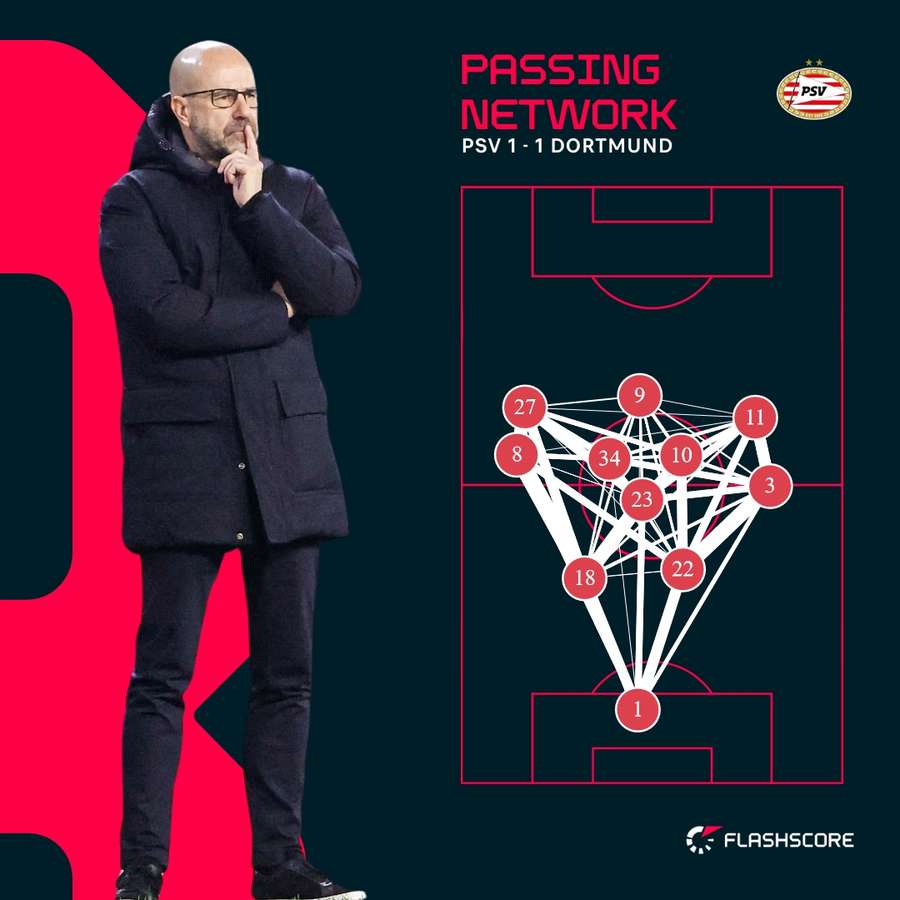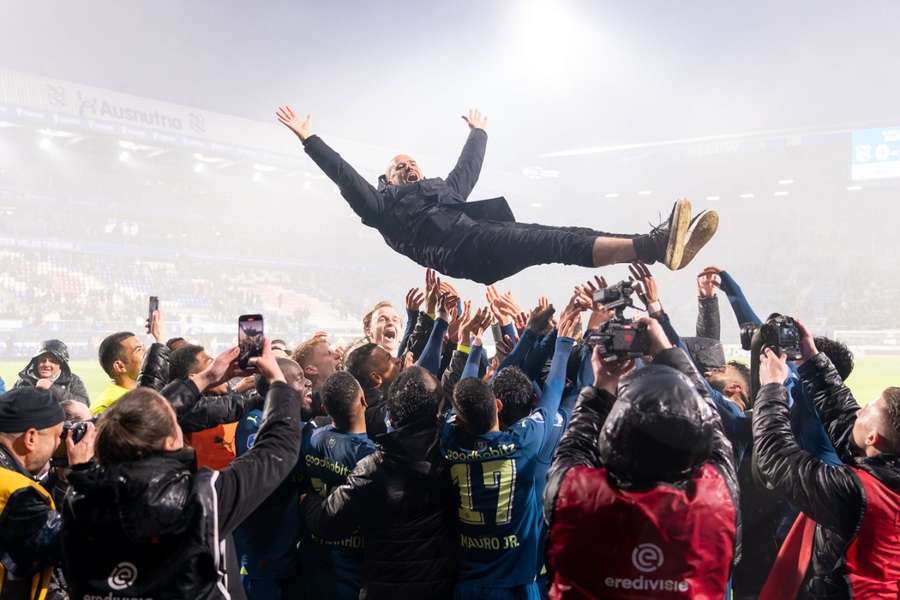For over a decade now, Dutch football has been in something of an identity crisis.
The nation burst onto the scene in the 1970s playing a brand of football - known as 'Total Football' - like no other, featuring a 4-3-3 system that had been scarcely used at the time and higher pressing and more fluid movement than had ever been seen before.
Rinus Michels and Johan Cruyff were the two faces of the movement which saw Ajax win three Champions Leagues in a row from 1971 to 1973 and the Netherlands reach the World Cup final in 1974 and 1978. Ever since the Amsterdam club and Oranje enjoyed such success, the nation has been permanently associated with the beautiful, free-flowing football that took the world by storm back then.
However, such football has been slowly but surely dying out for a long time now. The Dutch national team have played systems featuring five defenders rather than the traditional 4-3-3 in their last three major tournaments and are likely to do so again this summer, and even the exciting Ajax and Feyenoord sides built by Erik ten Hag and Arne Slot respectively have deployed somewhat more pragmatic 4-2-3-1 setups.
Even Pep Guardiola, one of Cruyff's former players and closest disciples has begun to favour a more conservative control-based approach in recent times, more often than not fielding four centre-backs and a static striker at Manchester City these days.
One man though who has never wavered in his mission to keep the legacy of Michels and Cruyff alive is Peter Bosz.
Admiration isn't really a strong enough word when it comes to Bosz's relationship with them. Obsession would probably be more appropriate.
The obsession started when Bosz was managed by Michels for six international matches in the early 90s. Straight after his manager gave a team talk, he'd go back to his bedroom and write down everything that had been said to make sure that he had it to hand when he began his coaching career.
He'd also cut out newspaper interviews with Cruyff that he'd come across and even decided to leave his homeland just as his managerial career there was gathering momentum in 2016 to take over at Maccabi Tel Aviv largely because he sensed an opportunity to spend time with and learn from the Dutch legend as his son Jordi was a director at the club.
Bosz's devotion to his compatriots has caused problems at times, with the lack of a Plan B losing him the Europa League final when he was at Ajax and an overly attacking - naive in the eyes of many - approach ultimately costing him jobs at Borussia Dortmund, Bayer Leverkusen and Lyon.
Despite those setbacks though and the fact that his approach had yet to win him a single major trophy, he had no intention of changing his ways when appointed PSV manager last summer. And in Eindhoven, things have finally clicked for him.
With two games to go, his team have already secured the Eredivisie title, have won 28 and lost just one of their 32 matches, have scored 107 goals and conceded only 19, and have done all that playing football that the Dutch Masters of old would be proud of.

Bosz inherited a PSV side that had been a bit of a mixed bag under predecessor Ruud van Nistelrooy.
They won the Dutch Cup and the Super Cup in the previous campaign while also finishing second in the league, but were vulnerable at the back, hugely reliant on moments of magic from star players Xavi Simons and Cody Gakpo going forward and were some way off Arne Slot's Feyenoord on the whole.
In the new manager's first competitive match in charge, the Super Cup against Feyenoord, those issues were nowhere to be seen. PSV were stable at the back, conceding only two shots on target, dangerous in attack despite the fact that Gakpo and Xavi had both gone and were comfortably the stronger side.
From that day onwards, he's abandoned Van Nistelrooy's 4-2-3-1 for a more traditionally Dutch 4-3-3 that gives the midfielders and both full-backs more attacking roles, involves the striker more, features much higher pressing off the ball and more of a focus on dominating possession, and it's improved things greatly at both ends of the pitch.
The team have currently conceded 11 goals fewer than they did last season, not because they have stronger defenders or play more cautiously but because the much more aggressive and effective pressing introduced by Bosz has allowed them to win the ball back faster. Without that ball, their opponents, of course, can't do much.
The coach has followed this mantra to the extent that instead of playing more defensively when faced with stronger sides such as Borussia Dortmund and Feyenoord in the biggest matches of the season, he's dropped a centre-back and moved midfielder Jerdy Schouten there with the aim of keeping the ball even more than usual because such sides are more dangerous with it than weaker ones, so he wants them to have it less.
It's a simple idea - teams can't attack without the ball so the best way to defend is to minimise the time they have on it - but one that few managers implement quite as extremely as Bosz does these days because of the risky nature of such a high defensive line. As Cruyff said, "Playing football is very simple, but playing simple football is the hardest thing there is."
The Eindhoven side have been much better when they've had the ball too despite the fact that Noa Lang, the man signed to replace Xavi and Gakpo, has been injured for most of the campaign.
This is partly because young Belgian winger Johan Bakayoko has developed into one of the Eredivisie's best, but mainly because of Bosz's tactics.
Being given the freedom to get further forward, playmaker Joey Veerman has been a revelation, getting seven goals and 17 assists across all competitions and time and time again being the man to break open the many deep-lying defences he and his teammates are faced with.
The other star man has been Luuk de Jong, who Bosz has had get more involved with the team's build-up play instead of staying in the box waiting for crosses. The veteran striker has been unstoppable in this more creative role, scoring 36 goals and setting up 17.
He's been helped by the fact that both full-backs play extremely attacking roles too, something which is seen less and less in an era where numerous managers are instructing one to stay back and form a back three.
In that area and many others, Bosz has chosen to reject the more cautious nature of modern football in favour of the more attacking ideals of his idols.
Maybe the only thing as exciting as the football Bosz's PSV play is the thought that they could yet get even better.
Usually, when a Dutch team impresses to this extent, the superpowers of football quickly come along and pick them apart, taking their best players and their manager, as has been the case with Ten Hag's Ajax and Slot's Feyenoord. However, there's reason to believe that the new Eredivisie champions won't suffer such a fate.
Bakayoko and Veerman look likely to leave for bigger things this summer, but they're the only players who do. Lang and Schouten are in the first years of their contracts, 33-year-old De Jong will surely see out his career in Eindhoven, loanee Malik Tillman has just been signed permanently from Bayern Munich and nobody else has really impressed enough individually to attract the interest of high-profile suitors, which suits the club just fine.
As for Bosz, the football he's intent on playing has already proved too attacking for the French and German leagues, and how things panned out at those clubs will make others in Europe's top five divisions wary of approaching him however well he does at PSV.
Even if one did, it's by no means a certainty that he'd choose to leave, except perhaps if the Dutch national team came calling. He's found a club where he can keep the football of Michels and Cruyff alive and win trophies doing so. At 60 years old and with plenty of experiences already in his locker, maybe that's enough for him now.


